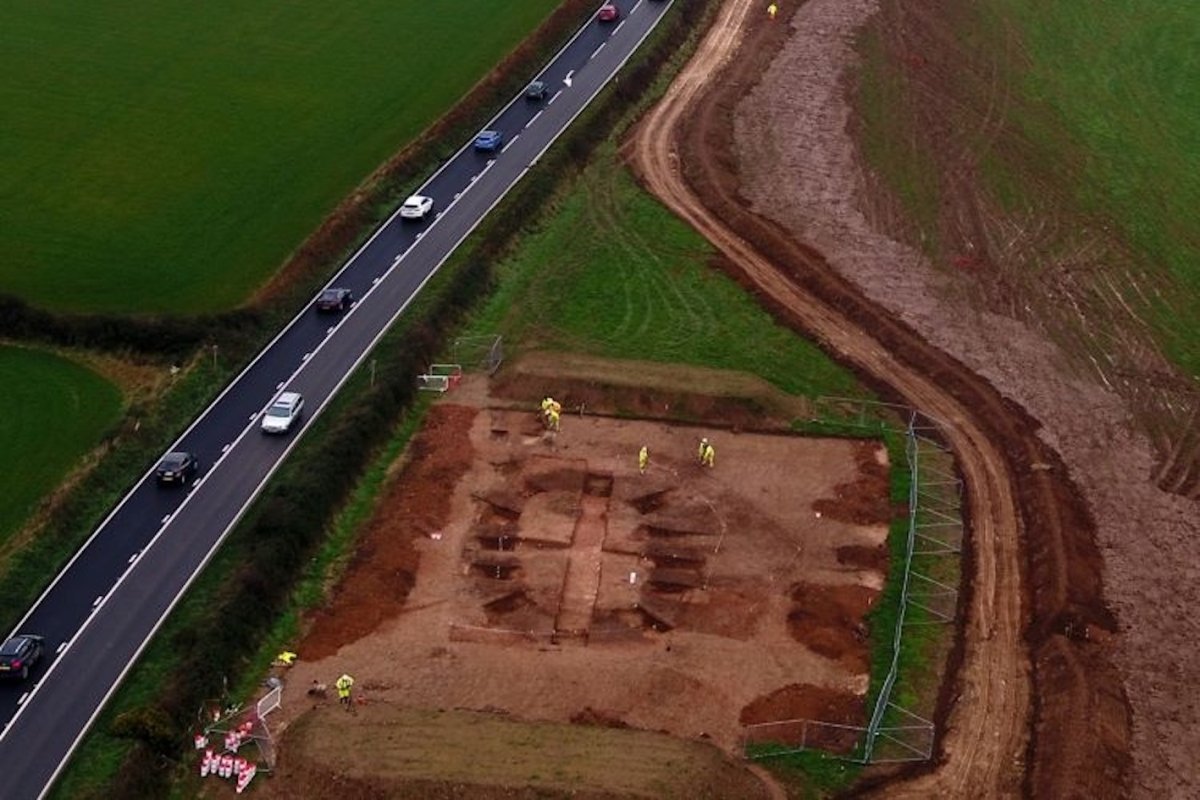Archaeologists have uncovered remains representing around "10,000 years of history" during road improvement works in southwestern England.
Among the finds are a tool preparation area traced back to the Mesolithic (Middle Stone Age) period, a Bronze Age burial mound, various Roman remains and an American D-Day camp from World War II.
The discoveries came during work to upgrade a section of the A30—one of the longest roads in the United Kingdom, which runs southwest for almost 300 miles from London to Land's End, the most westerly point of mainland England. The stretch of road being upgraded lies in the county of Cornwall between the Chiverton Cross and Carland Cross roundabouts.
Since 2020, Cornwall Council's Cornwall Archaeological Unit (CAU) has been conducting fieldwork as part of the upgrade project and the team have now announced their initial results.
The nature of the project allowed the researchers to explore a completely random (in archaeological terms) cross-section across nearly 10 miles of land in Cornwall. This revealed a number of significant sites that would otherwise have remained unknown.
The remains that the researchers unearthed span a period of history stretching from the first Mesolithic hunter-gatherers who repopulated the region following the end of the last Ice Age to the 20th century.
"The results from the project are highly significant. Although such a large scheme was bound to unearth important discoveries the scale and time-depth of these have far exceeded our expectations," Sean Taylor, a senior archaeologist with the CAU who managed the A30 project, told Newsweek. "Undoubtedly" the most significant find from the project was the earliest: a huge scatter site dotted with thousands of flint tools and waste, Taylor said. According to the archaeologists, this marks an area where people gathered for millennia during the Mesolithic period to prepare tools from flint pebbles carried up from the coast.

In Britain, the Mesolithic period, which was generally characterized by people living hunter-gatherer lifestyles, lasted from 10,000-6,000 B.C., according to Taylor, although definitions vary.
"Evidence from this remote period is scant and finding a site with around 100,000 flints gives us a rare window into that time period and should enable us to reconstruct some of the activities that were being carried out on the site," Taylor said. "But on top of this, by using the sampling methods that we did, we found evidence for other stone tools that would normally have been missed—small slate beads decorated with resin and other shaped stone tools whose function we are in the process of interpreting."
He added: "We also found pits and postholes that we think are associated with the scatter, the charcoal and plant remains from which should allow us to get radiocarbon dates for the activity on site."
The archaeologists also uncovered sections of old road, which Taylor described as "highly significant"—not least because of the nature of the project and the fact that this is an area of study for which little evidence had been found until recently.
The one section of old road that the archaeologists could guess a date for—located near the hamlet of Marazanvose—likely dates back to Britain's Roman period (A.D. 43-410) or perhaps even earlier.
"We have taken samples from other sections that may be used to obtain dates for these so we should establish this once and for all during our post-excavation works," Taylor said.
The third site that stood out for the archaeologists was the remains of a United States Army base located next to the Chybucca junction that was in use from 1943 up until D-Day in June 1944.
"This is history representing a hugely significant moment in our recent past, the liberation of Europe, and the sacrifices that were made will be commemorated again this year, the 80th anniversary," Taylor said.
He continued: "To find and document the remains of one of these camps, and the everyday objects of people who may have fallen shortly after leaving our part of the world, is very humbling and deserving of being publicized, not least because there may still be people alive that served in the camp or had contact with those who did. Which is why we would welcome contact from anyone with memories of the camp or its occupants."
Among the other finds the team made were a burial mound from the Bronze Age containing cremated remains in an urn and the remnants of three or four Romano-British houses.
Councillor Martyn Alvey, Cornwall Council's Cabinet member with responsibility for the archaeology service, said in a press release: "As ever, the team has worked brilliantly to discover, identify and interpret a wealth of material which gives us a real insight into the way people lived across so many periods."
Do you have a tip on a science story that Newsweek should be covering? Do you have a question about archaeology? Let us know via science@newsweek.com.
Uncommon Knowledge
Newsweek is committed to challenging conventional wisdom and finding connections in the search for common ground.
Newsweek is committed to challenging conventional wisdom and finding connections in the search for common ground.
About the writer
Aristos is a Newsweek science reporter with the London, U.K., bureau. He reports on science and health topics, including; animal, ... Read more
To read how Newsweek uses AI as a newsroom tool, Click here.








